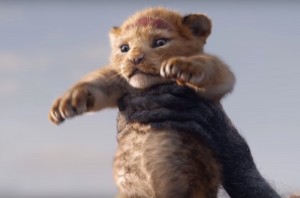Virtual Live-Action in a Virtually Real Film
The new Disney movie Lion King marks a threshold for a new way of making a film, another step erasing the line between artifice and reality, between the virtual and the natural.
The entire set of the film — all the background and characters –are virtual, that is, computer created. The entire movie was shot in what we would today call VR. As this article makes clear, the director John Favreau says “We’ve basically built a multiplayer VR filmmaking game just for the purposes of making this movie.” This is a method that will be ordinary, if not normal, for many movies in the future.
The film is created by using virtual cameras inside the virtual wildlands of Africa. The virtual animals go through their programmed moves, like an actor would, and the cinematographers must capture and record their performance inside the VR world. Sometimes the direct will reshoot a scene to get a different angle, or a shift in the light. The director of photography, Caleb Deschanel, says “you really are doing exactly what you do when you make a movie.” The actors that voice the animals will act out their roles in a room rigged with microphones. They will be filmed as they move and their movements will be used to guide the animal movements. Those human actions will be translated into lion, or baboon or elephant behaviors, but their human voices remain. The action is built around the voice.
Today live-action action movies are often completely sketched out in a rough crude “previs” (pre-visualization) stage before they are filmed. That way the directors can watch the movie before it is filmed. Animated movies, like those from Pixar, are also completely prevised at various stages before being rendered or lit, which enables everyone working on them to see the movie before it is made. Now with ever more realistic movies, not of fantasy worlds, but of the real world, the previs stage is the same default. In a real sense, Lion King is an animation. It will be interesting to see how Hollywood classifies it. It totally looks live action, but like Toy Story, it is actually painted layer by layer, from rough doodles to finished 3D photo realistic synthetic video.
The movie Avatar pioneered in creating totally artificially constructed worlds, but in that movie the actors were “live-action” or real. In Lion King the actors are animals that are not real. Ready Player One also had virtual sets and virtual actors, and it was filmed by pushing a virtual camera through the virtual set, but the world they inhabited was not quite photo realistic in the same way or detail that Lion King is; here nature looks real down to each blade of grass.
The new way of movie-making uses a virtual production process which employs a video game engine to create the landscapes and characters, including animals. Each object, scene, character is computer generated to look so convincing that most people can’t tell they are not real. Except the animals may speak, or humans fly. Lion King is the cumulation of four strands of new filming: 1) CGI, computer special effects, 2) wholly animated movies like Pixar’s Coco or Up, and 3) the “previs” multiplied by a 1,000 and 4) VR and video games. The special effects guru Robert Legato says “Everybody does VFX movies, everybody does animated movies, everybody does live-action movies—but to mix all of them together to make something that belies how it was done is, I think, the game-changing portion of all this.”
How far can this go? I believe it will go all the way. It may become easier/better to creating a New York City apartment in LA (or Beijing) to film a movie in, than to film in an apartment in New York City. Because movie making is about controlling all the variables, which are easier to control, and easier to expand, when done virtually. All the world becomes a stage, one that you can’t tell is not the real world. That dream has been way to expense to even imagine, but with Moore’s Law it won’t be out of reach for long. As Glenn Derry, a veteran fx leader said, “We’ll know virtual production will have made it, when we do rom-coms with it.”



